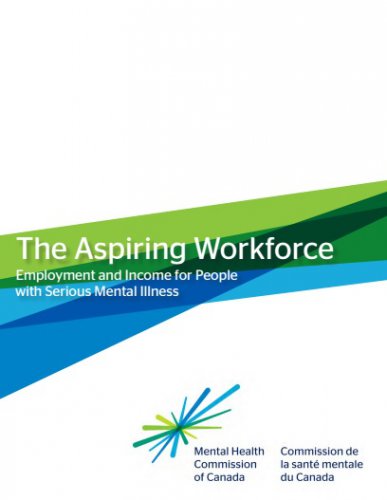A disproportionate number of people with serious mental illness in Canada are unemployed, or detached from the labour market, and the numbers of people with mental illness transitioning onto disability income support programs are rising. Many of our current ways of thinking about the work capacity of people with mental illness, and acting upon the problem, are ineffective. Systemic forces can lead to the employment marginalization of people who have skills and expertise to contribute to the Canadian economy and workforce.
We urgently need a national program of action to change this situation. There are effective ways to increase employment; this is a problem that has solutions. There is no one answer, but instead, a system of responses are required to effectively improve this issue.
In September 2009, the Mental Health Commission of Canada (MHCC) contracted the Centre for Addiction and Mental Health to undertake “The Aspiring Workforce” research project, in collaboration with researchers from the University of Toronto and Queen’s University. The intent of the project is to identify existing and innovative practices that will help people living with serious mental illness to secure and sustain meaningful employment and/or a sustainable income.
The term “Aspiring Workforce” describes those people who, due to mental illness, have been unable to enter the workforce, or who are in and out of the workforce due to episodic illness, or who wish to return to work after a lengthy period of illness. These people are as diverse as other Canadians in their life experiences and identities, and come from all regions and cultural and linguistic groups across Canada. But, like any other Canadian, they share a desire and need for meaningful employment and a sustainable income.
Canadians living with significant mental health issues experience high rates of unemployment. The “Aspiring Workforce” project is built on the understanding that access to work and to disability income support are intricately related for people with significant mental illnesses. Evidence from research shows that access to work can be improved through the use of supported employment programs. Supported employment is often provided by a variety of mental health professionals to help people find work that they are interested in, in the regular labour force, with ongoing support to help people within their jobs.
Download The Aspiring Workforce: Employment and Income for People with Serious Mental Illness
TABLE OF CONTENTS
| RESEARCH TEAM | |||
| EXECUTIVE SUMMARY | |||
| INTRODUCTION | |||
| Supported Employment: A Review of the Literature and Canadian Perspectives | |||
| SUMMARY | |||
| EXECUTIVE SUMMARY | |||
| Full report | |||
| An Overview of Provincial Disability Programs and Work Incentives/Disincentives | |||
| Main findings | |||
| Full report | |||
| Figure 1. ODSP Recipients by Types of Disabilities | |||
| Figure 2. ODSP Recipients by Most Prevalent Types of Disabilities | |||
| Figure 3. Percentage Receiving Work-related Benefit within Each Type of Disability | |||
| Figure 4. Monthly Median Earnings among ODSP Recipients within Each Type of Disability | |||
| Conclusions | |||
| Environmental Scan of Social Businesses | |||
| Summary | |||
| Executive summary | |||
| Full report | |||
| Table 1. Summary of Business Surveyed by Type | |||
| Table 2. Business Annual Incomes | |||
| Table 3 Size Based on Number of Employees | |||
| Table 4 Business Employee/Member Population | |||
| Table 5 Incorporation Models | |||
| Table 6. Distribution of Businesses by Province, and Mix of Disability Type as per Business Mission | |||
| Recommendations | |||
| A Legislative Model of Income Support in Canada for People with Mental Illness | |||
| Summary | |||
| Executive summary | |||
| The current environment | |||
| The aspiring workforce | |||
| Current trends | |||
| Recommendations | |||
| Full report | |||
| Conclusions and recommendations | |||
| Workplace Know-How | |||
| Summary | |||
| Executive summary | |||
| Conclusions | |||
| Full report | |||
| Conclusions and recommendations | |||
| STUDY RECOMMENDATIONS | |||





